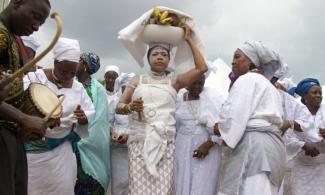
Traditional religion practitioners in Kwara State, Nigeria have commenced a fundamental rights enforcement suit before a Federal High Court in Ikoyi, Lagos, against the Inspector-General of Police (IGP) and seven others over the alleged violation of their fundamental rights.
The Independent reports that the other defendants in the suit numbered FHC/L/CS/1674/2023 filed by a legal practitioner, Olukoya Ogungbeje, are the Kwara State Police Commissioner, the State Government, Registered Trustees of the Council of Ulama (Islamic Clerics), Justice Salihu Mohammed (Executive Secretary of the Council of Ulama), Sheikh (Dr) Mohammed Bashir Saliu (Chief Imam of Ilorin and Chairman of the Council of Ulama), Alfa Abdulsalam Baba Tonile Okuta-Agidu, Kwara State Magistrate Court in Ilorin, and the Nigerian Correctional Service (NCoS) in Ilorin.
The claimant alleged that he is suing all the respondents in the public interest on behalf of traditional religion adherents and worshippers in Nigeria, in accordance with freedom of religion, thoughts, belief, and conscience under Sections 36, 38, 42, and 46 of the Constitution of the Federal Republic of Nigeria 1999, Order II Rules 1 and 2 of the Fundamental Rights (Enforcement Procedure) Rules 2009, Order XI of the Fundamental Rights (Enforcement Procedure) Rules 2009, and under the court’s inherent jurisdiction as imbued by Section 6(6)(b) of the Constitution.
According to the court processes, Ogungbeje pleads with the court for the following: “A determination of whether he can approach the court in the public interest for the enforcement of any of the Fundamental Rights expressly enshrined under Chapter IV of the Constitution in accordance with the Fundamental Rights (Enforcement Procedure) Rules 2009, seeking redress for violation or breach of any of the rights guaranteed by the Constitution of the Federal Republic of Nigeria, 1999 (As Amended), whether the reliefs sought are personal to the applicant or not.
“A determination of whether the fundamental rights to freedom of religion guaranteed under Section 38 of the Constitution extend to traditional religion adherents who are citizens of the Federal Republic of Nigeria and can enjoy the right to freedom of religion, practice their religion, and celebrate cultural festivals without any let or hindrance by the respondents in any part or State in Nigeria.
“A determination of whether the stoppage of the Isese cultural festival slated for August 20, 2023, and the arrest, arraignment, and remand of traditional religion adherents and worshippers by the respondents without any cause and under the guise of defamation of character, do not constitute a brazen violation of traditional religion adherents’ rights to freedom of religion, thoughts, and conscience.
“A determination of whether, if the above questions are answered affirmatively, the stoppage of the Isese cultural festival and the arrest, arraignment, and remand of traditional religion adherents as Nigerian citizens is not a violent violation of the rights to a fair hearing and right to freedom of religion, as enshrined under Sections 36 and 38 of the Constitution of the Federal Republic of Nigeria, and ought not to be deprecated and declared unconstitutional.”
This case is premised on the lingering religious controversy in Kwara State regarding the refusal of Islamic groups and clerics in Ilorin to allow traditional religion practitioners to hold their festival in the city.
This was followed more recently by the arrest of Adegbola Abdulazeez, a traditional religion practitioner and activist, also known as Talolorun, who was arrested and remanded in jail by a Magistrate Court in Kwara State for allegedly insulting Islamic clerics and burning the Quran.